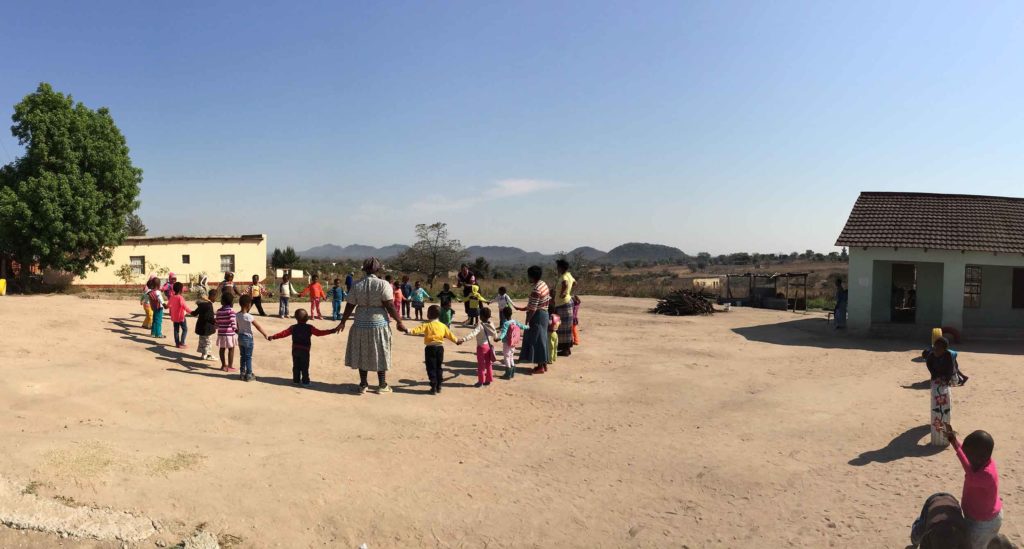Dr Catherine Draper, University of the Witwatersrand, South Africa
“How do I set my child up best for school? How do I help them reach their full potential?”
These are questions that parents ask themselves the world over, and there are plenty of enterprising individuals ready to offer them their latest solution. Increasingly, these solutions are technology-based and encourage earlier exposure to academic skills, such as reading, writing and maths. But what if one of the simplest solutions could be to get your child off their screens, and send them to play outside with their friends? What if these could be things that set your children up best for school, as well as promote social, emotional and physical health?
There is a growing body of research in this area, particularly for children of pre-school age (3-5 years). Many researchers are focusing on a key component of cognitive development in the pre-school years: executive function. Executive functions can be described as the mental skills you need to pay attention and to concentrate, and when it would not be beneficial, sufficient or possible to rely on instinct or intuition, or to respond automatically. The reason why so many researchers are interested in executive function in the early years is because it has been found to predict academic achievement, school readiness, lifelong achievement, health, wealth and quality of life. Executive function also contributes to self-regulation, which could be referred to as self-control in adults, and has been defined as the ability to control our thoughts, feelings and behaviour.

In children, a positive association has been found between physical activity and executive function, although it’s not just about more running around. The kinds of physical activities that are beneficial for executive function include those that involve complex body movements, such as coordinating limbs on the left and right sides of the body, hand-eye coordination, rhythmic movement, and activities that get children to think while they move. Tasks requiring gross motor movement (big limb movements) have also been shown to predict better maths and emerging literacy scores in young children. Also, physical activities that enhance children’s happiness, social support and self-confidence may be more effective at improving executive function.
“Unfortunately, most of what we know about executive function, physical activity and gross motor skills is from high-income countries […] We have been breaking some new ground in this field in South Africa by exploring these relationships in pre-school children from low-income settings.”
Unfortunately, most of what we know about executive function, physical activity and gross motor skills is from high-income countries. Thanks to a grant from the British Academy, a delivery partner of the Newton Fund managed by the Department for Business, Energy and Industrial Strategy, and in collaboration with Gaia Scerif, Professor of Developmental Cognitive Neuroscience at the University of Oxford, we are breaking new ground in this field in South Africa by exploring these relationships in pre-school children from low-income settings. Our findings are preliminary at this stage, but we have confirmed that executive function indeed plays an important role in school readiness. And the relationship between executive function and gross motor skills is stronger than the relationship between executive function physical activity, which provides some support for the argument that unstructured physical activity (which is what we mostly observe in these populations) does not necessarily have the desired effect on young children’s cognitive development.
This research is informing the development of strategies to enhance cognitive development in low-income South African settings, targeting both the pre-school and home environments. In pre-school environments, a key challenge is a focus of pre-schools as merely the provision of a place for children to be during the day, rather than the promotion of early childhood development. Furthermore, child safety, hygiene, food insecurity, and a combination of overweight/obesity and underweight place the promotion of early learning and healthy behaviours further down the priority list. In addition to social and economic challenges, and sometimes because of them, the capacity of teachers is often limited, and teachers may not have access to training opportunities and resources to stimulate early childhood development. These challenges are amplified in rural environments, which remain under-served and under-resourced in South Africa. Strategies for the pre-school environment will therefore focus on empowering teachers in their role, and providing training to conduct simple and cost-effective activities to promote cognitive development and healthy behaviours with the children in their care. In urban pre-schools where space for play is generally very limited, it is important that these activities are able to be conducted in the space that they have available.
“In addition to social and economic challenges, and sometimes because of these, the capacity of teachers is often limited, and teachers may not have access to training opportunities and resources to stimulate early childhood development.”
Decisions around the strategy to reach parents and caregivers have been largely influenced by the challenges experienced in trying to engage parents, many of whom face similar social and economic challenges to those mentioned above. In these settings, parents and caregivers do not necessarily understand the key role they play in their child’s development, but rather see this as the pre-school’s responsibility. Take these realities into consideration, we are currently piloting an intervention to reach parents and caregivers in the home, to remove the challenge of getting them to their child’s pre-school. The main aim of the intervention is to help parents/caregivers feel empowered in their role of stimulating their child’s development, and to understand how various health behaviours of their child (physical activity, screen time, sleep and diet) can promote their child’s cognitive development and set them up to reach their full potential.
By Dr Catherine Draper, University of the Witwatersrand, South Africa
This research project was funded by the British Academy, a delivery partner of the Newton Fund managed by the Department for Business, Energy and Industrial Strategy.
Image credit: Pawel Czerwinski via Unsplash
